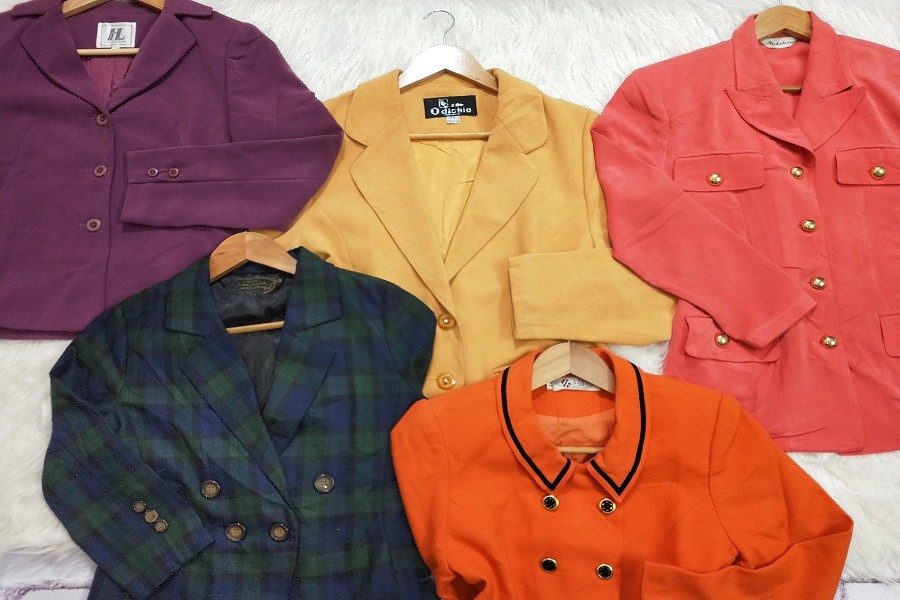The popularity of thrift shopping has grown in recent years thanks to its affordable prices and unique pieces. These stores cater to various personal tastes and budgets, allowing customers to save money while still finding beautiful items.
The question is, does thrift shopping help counteract rapid fashion, or is it merely a new trend in fast fashion?
Where our clothes go
With more affordability, many have become addicted to buying and trying new trends. Shopping for clothing has become a way for people to express themselves and show off on social media. But what happens to all of these clothes once they're no longer in style? Are they donated, recycled by the fashion industry, or thrown away?
The garments we wear every day contribute significantly to environmental pollution. When we are through with our clothes, they frequently wind up in landfills, where they consume space and leach toxic substances into the soil and water. 73 per cent of waste ends up in landfills. In 1980, the average annual clothing expenditure was 12 items. According to recent figures, this quantity has rapidly increased to 50 items yearly.
The fashion business is projected to be the second largest polluter in the world after the oil industry. Luxury brands typically release new fashion products every 3-4 months. However, fast fashion companies like Zara and Forever 21 have been able to stay ahead of their competitors by quickly producing on-trend items at lower prices, giving shoppers access to runway styles at a fraction of the cost. This constant turnover of clothing keeps consumer interest high.
However, there are ways to combat this problem, like supporting ethical and sustainable fashion brands prioritising environmentally-friendly practices. Another option is to embrace the trend of thrift shopping, where clothes are repurposed and given a new life, reducing the need for new clothing production.
Manufacturing of fashion clothing in Bangladesh
Bangladesh is the second-largest apparel-exporting country in the world, making it a popular choice for many fashion industries. The country's quick response manufacturing makes it a hub for fast fashion, which also means it is vulnerable to the waste produced by the fashion industry.
In particular, certain areas of the capital are known for their access to rejected export-quality fast fashion clothing sold at extremely affordable prices. This has contributed to the growth of the thrift world.
Thrift Stores in Bangladesh
Many thrift sellers source their clothing from export-quality items previously discarded after only a few uses. In addition, these stores often invite customers to sell their second-hand clothing, resulting in longer use of products.
People have begun to embrace the idea of reusing clothing instead of constantly buying new items. However, some people may still be tempted to impulsively buy cheap, fast fashion items from these stores, leading to an increase in the number of clothes per person.
Seller's perspective
Mulberry Clothing, a thrift store run by siblings Arshad Shawki and Kashfia Sujana, has been in the thrift store industry for some time. The pair work together on every aspect of their business, from stocking the store to actively styling each piece to create unique looks.
Sujana and Shawki, both students, have made the thrift business their profession in addition to their academics. Sujana attends Birshreshtha Munshi Abdur Rouf Public College, while Shawki is an undergraduate student at North South University. In addition to managing their online thrift business, they also assist their mother in running her online shop for handmade embroidered tote bags.
"We believe sustainable fashion is the way to go, as the fast fashion industry is leading to a huge waste of clothing and energy. Reusing clothing and accessories should be more popular among people," said Sujana, "As a thrift store, we make it easy for our customers to choose and buy affordable, sustainable clothing."
Thrift store owners like Shawki and Sujana are helping customers embrace the idea of reusing clothes. In places like Bangladesh, where many rejected garments end up in landfills, thrift stores provide an important alternative. Many are willing to sell their second-hand items to continue the cycle of sustainable fashion.
At Mulberry Clothing, the goal is to offer customers high-quality products at the lowest possible prices. "Most of our customers come to us looking for an affordable option, but they also appreciate being able to browse a variety of clothing options from different cultures that are difficult to find in one place," said Sujana.
"They don't mind minor defects if it means they can find something unique. We always include a photo of any faults in our posts to ensure customers are aware of any issues. We think customers are drawn to unique clothing at a reasonable price," she added.
Sweet Repeats Bd, another friendly online thrift store by Fatima Tasnim Maliha, a fresh graduate from BRAC University, shared her stance on the impact of thrifting.
"The cycle of reusing clothes is the main theme of our business, and it always comes with an environmental safety purpose," said the owner.
"My store is positively motivating people to wear sustainable clothing, as people are becoming more conscious and shifting their interest to thrift items. They can enjoy good-quality, affordable clothing while also helping the environment. People love the idea of pre-loved items supporting a great cause like saving our planet."
The rise of environmentally conscious sellers has helped customers understand the importance of sustainable fashion practices. Many buyers were previously unaware of their clothing choices' ethical and environmental implications. Still, thrift stores are now catering to a sustainable practice of reusing clothes, making them a better option for individuals who want to stay on-trend while also being mindful of their environmental impact.


